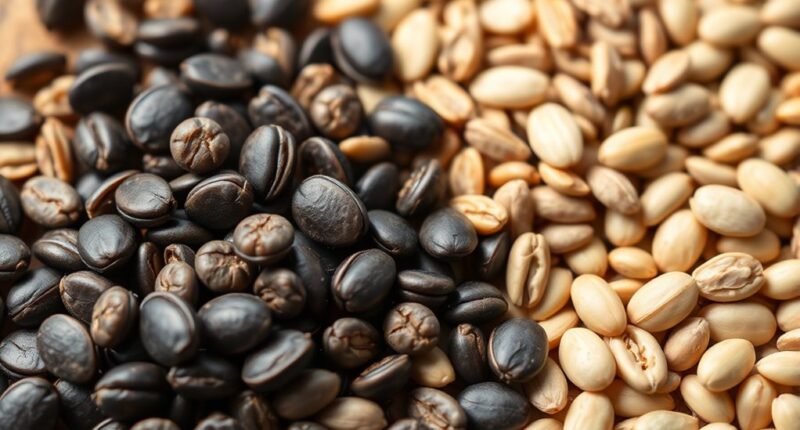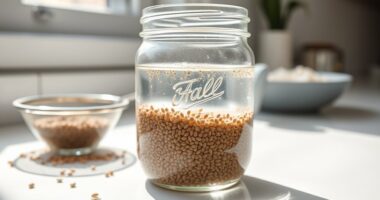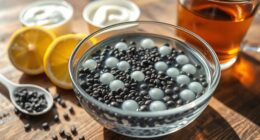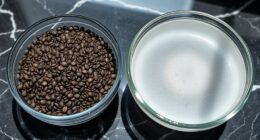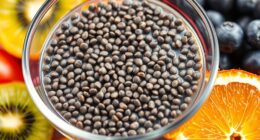When comparing chia seeds to other seeds like sunflower or pumpkin, you’ll find chia offers a remarkable nutritional punch, especially in omega-3s, fiber, and antioxidants. Unlike sunflower seeds, which are high in vitamin E but lower in fiber, or pumpkin seeds, rich in magnesium and zinc, chia seeds are versatile, easy to prepare, and can absorb liquids to add texture to your dishes. Curious to see how these differences can boost your health? Keep exploring for more insights.
Key Takeaways
- Chia seeds are rich in omega-3s and fiber, offering more concentrated health benefits than sunflower or pumpkin seeds.
- Unlike sunflower and pumpkin seeds, chia seeds can be used whole without grinding and absorb liquids to thicken recipes.
- Sunflower seeds provide high vitamin E and healthy fats but lack the high fiber content of chia seeds.
- Pumpkin seeds are good sources of magnesium and zinc but have lower omega-3 levels compared to chia seeds.
- Chia seeds are versatile, neutral in flavor, and require minimal preparation, making them ideal for beginners.

When comparing chia seeds to other types of seeds, it’s clear that each offers unique health benefits and nutritional profiles. Chia seeds are celebrated for their impressive nutritional benefits, including high levels of omega-3 fatty acids, fiber, protein, and antioxidants. These nutrients help support heart health, improve digestion, and boost energy levels. Unlike many other seeds, chia seeds can absorb up to 10 times their weight in water, forming a gel-like texture that makes them versatile in various culinary uses. You can sprinkle them on yogurt, blend them into smoothies, or use them as an egg substitute in baking. Their neutral flavor allows them to seamlessly integrate into sweet and savory dishes alike, making them a popular choice for health-conscious cooks.
Compared to sunflower or pumpkin seeds, chia seeds are more concentrated in certain nutrients, especially omega-3s and fiber. Sunflower seeds, for example, are rich in vitamin E and healthy fats, but lack the high fiber content found in chia. Pumpkin seeds are a good source of magnesium and zinc but don’t offer the same level of omega-3 fatty acids. When considering culinary uses, chia seeds shine because of their ability to absorb liquids and thicken recipes. They’re often used to make puddings or as a topping for oatmeal, adding a nutritional boost with minimal effort. Unlike flaxseeds, which need to be ground to liberate their nutrients, chia seeds can be used whole, saving you time and effort while still providing maximum health benefits.
You’ll also find that chia seeds are highly adaptable in the kitchen. Their mild flavor doesn’t overpower other ingredients, so you can add them to smoothies, cereals, or baked goods without changing the taste. Their high fiber content aids digestion, helping you feel full longer, which can support weight management. In contrast, seeds like sesame or poppy are primarily used for flavor and texture rather than their nutritional benefits. Chia seeds are also easy to incorporate into your diet because they don’t require grinding or special preparation, unlike flaxseeds. Additionally, air quality improvements from using air purifiers can contribute to a healthier environment that complements your nutritional efforts by reducing airborne allergens and pollutants.
Frequently Asked Questions
Are Chia Seeds Suitable for All Dietary Restrictions?
Yes, chia seeds are suitable for most dietary restrictions. They’re naturally gluten-free, making them a great gluten-free option for those with celiac disease or gluten sensitivity. Plus, they’re vegan-friendly, so you can include them in plant-based diets. You can easily incorporate chia seeds into your meals or snacks without worry, as they align with many special diets and offer versatile nutritional benefits.
How Do Chia Seeds Impact Blood Sugar Levels?
Chia seeds help stabilize blood sugar levels by promoting better blood sugar regulation and a slower insulin response. When you eat them, their high fiber content slows digestion, preventing spikes in blood sugar. Including chia seeds in your meals can improve your body’s ability to manage glucose. As a result, you may experience more consistent energy levels and better overall blood sugar control, especially if you’re mindful of your carbohydrate intake.
Can Chia Seeds Replace Other Seeds in Recipes?
Yes, you can replace other seeds with chia seeds in recipes. Their substitution flexibility allows you to swap them easily, especially when you need a binding agent or added fiber. Chia seeds have a mild, nutty flavor that generally pairs well, but check for flavor compatibility depending on your dish. Keep in mind that chia seeds absorb liquid, so adjust the moisture content to maintain the recipe’s consistency.
Are There Any Side Effects of Consuming Chia Seeds Regularly?
Consuming chia seeds regularly is generally safe, but about 1-2% of people may experience potential allergenic reactions. You might also face gastrointestinal discomfort, such as bloating or constipation, if you eat too many or don’t hydrate well. To minimize these effects, start with small portions and drink plenty of water. Monitoring your body’s response helps guarantee you enjoy the health benefits without adverse side effects.
What Are the Environmental Benefits of Growing Chia Seeds?
Growing chia seeds offers significant environmental benefits. You promote sustainable cultivation by choosing chia, which requires less land and resources. Its water efficiency means you use minimal water compared to other crops, helping conserve this essential resource. By adding chia to your diet, you support eco-friendly farming practices, reduce your carbon footprint, and contribute to a healthier planet, all while enjoying a nutritious seed.
Conclusion
In the world of seeds, chia seeds stand out like a shining star among the rest, offering unique benefits and versatility. While other seeds bring their own flavors and nutrients, chia’s high fiber and omega-3 content make it a top choice for many. Incorporate them into your diet like adding vibrant colors to a canvas—small, but impactful. Ultimately, choosing chia seeds is like embracing a powerful tool to boost your health journey.
